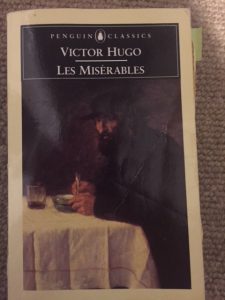We’re all ‘miserables’ in need of God’s grace
 As I sat down to write of the profound effect Victor Hugo’s Les Miserables had on my life, I found to my astonishment that I was writing in the voice of my 14 year old self. And so I wrote:
As I sat down to write of the profound effect Victor Hugo’s Les Miserables had on my life, I found to my astonishment that I was writing in the voice of my 14 year old self. And so I wrote:
I borrowed Les Miserables from the mobile bus library when I was 14. I liked reading and each week with a friend I rode my bike to borrow books.
The book seemed like an adventure story, so I read it. It was about a man who had a hard life. He helped people.
He rescued a poor girl and really cared for her. There were lots of adventures. But then, when she married, it was strange because he felt he shouldn’t be with her new family. This was sad. Eventually he died, nearly alone, but the candlesticks were with him. They reminded him always of a man who many years ago saved his life and helped him to go a different way. He was given a chance and it was not easy but he made choices to go that better way. They were sometimes hard choices. Choices matter.
But some people are cruel and they don’t give you another chance, and that’s not fair. In the story there were women and children who hardly ever got any chances. People were cruel to them. I didn’t like that. It was unfair. But the man, because he had been given a second chance by the first kind man, he then himself gave people second chances. I liked that. I wanted to be like these two men. They were both kind and gave second chances to all sorts of people. Second chances matter.
Growing up I didn’t have a father. I lived with my two sisters, mother, grandmother and great uncle. They all loved me and gave me second chances – and lots more chances. But people were not kind to my mother. They wouldn’t let us into a father and son night because she wasn’t a father. But a kind man from church saw my mother crying. He asked her if he could be my father for an hour and he took my friend, his real son, and me to the meeting. He was a good man who stood up for my mum and me.
I think that God helped the two men in the story. The candlesticks showed that. Throughout the rescued man’s life he carried the Bishop’s candlesticks with him to remind him that he belonged to God.They were with that man when he died: “He lay back with his head turned to the sky, and the light from the two candlesticks fell upon his face.”
Reading this, I do indeed hear my younger voice. I have never forgotten the story Les Miserables nor the two men, the second chance, and the story of the candlesticks.
The themes of Les Miserables (‘The Poor and Wretched’) are the themes of our own lives.
The released, but brutalised, convict Jean Valjean, having received the Bishop’s hospitality, then robbed him of silver cutlery. Valjean is subsequently captured by the police and brought for condemnation before the Bishop. To Valjean’s astonishment, the Bishop insists the cutlery has been given to Valjean and even adds two silver candlesticks (“You forgot to take these”).
Privately, the Bishop challenges Valjean: “You promised me to become a good man. I am buying your soul. I am rescuing you from a spirit of perversity and giving it to God” What beauty! The joy and power of grace and grace’s agenda.
Yes, forgiveness is given. Grace is received. A second chance begun. But the very next day, the second chance is dramatically thrown into question: Valjean robs a vagrant boy of a coin. The boy protests, struggles briefly, but then flees in fright. Valjean seems to suddenly come to himself and rushes after the boy but cannot find him. Guilt-ridden and in despair, he weeps in remorse.
This turning point (while omitted in contemporary musicals) is a key to understanding the book: “Did any voice whisper to him that he was at a turning point in his life, that henceforth there could be no middle way for him, that he must become either the best of men or the worst?… What was certain, although he did not realise it, was that he was no longer the same man. Everything in him was changed.”
Jean Valjean struggled to live out the consequences of forgiveness, of the grace of the second chance. So unfolds a wonderful story of redemption, hope, sacrifice and love: of living out the Bishop’s gift of the candlesticks.
I think that’s why I treasure my own ‘candlesticks’: reminders of God’s grace and forgiveness.
See, Inner Life: Book: Bishop John Harrower reflects on reading Victor Hugo’s classic ‘Les Miserables’ http://tma.melbourneanglican.org.au/inner-life/harrower-on-les-mis-290917 September 29 2017

